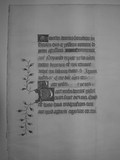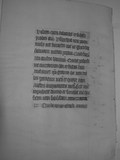Kenyon College Leaf 45
This leaf is from a Book of Hours made in France in the later fifteenth century, and its text conforms very clearly to the Use of Paris. The vellum is very well prepared, and measures 18.5 x 13 cm; the text block is ruled in red, and the main ink is a dark slate color. The formation of the letters, both in shape and in position above the ruling, gives them a slightly insubstantial quality; there are, moreover, a surprising number of grammatical and other scribal errors in these leaves. Simple vines of red, blue, and gold flower buds ascend and descend from at least one large initial on each leaf; the blue ink used for the decoration is especially vivid. See Denison University Leaf 45 for more information about this manuscript.
Text: Based on the leaves we have seen, this Book of Hours accords with the Use of Paris: the leaves in the Ohio State University and Cleveland Institute of Art portfolios provide the best clues. This leaf contains text from the Office for the Dead, Matins, the First Nocturne, specifically from Psalms 7 and Job 7. Note the missing illuminated initial on the recto in "Et ne nos."
 Kenyon Leaf 45 Recto
Kenyon Leaf 45 Recto
Kenyon College Leaf 45 Recto
 Kenyon Leaf 45 Recto Transcription
Kenyon Leaf 45 Recto Transcription
Confitebor Domino secundum iustitiam eius: et psallam nomini Domini altissimi.
Ant. Nequando rapiat ut leo animam meam: dum non est qui redimat, neque qui salvum faciat. V: A porta inferi. R: Erue Domine animas eorum. Pater noster. [E]t ne nos.
Parce mihi Domine: nihil enim sunt dies mei. Quid est homo, quia magnificas eum: aut quid apponis erga eum cor tuum?
 Kenyon Leaf 45 Recto Translation
Kenyon Leaf 45 Recto Translation
[Psalms 7] ...I will confess to our Lord according to his justice: and will sing to the name of our Lord most high. Ant. Lest sometime he as a Lion violently take my soul: whilst there is none to redeem nor to save. V: From the gates of hell. R: Deliver O Lord their souls. Our Father. Lead us not into temptation.
[Job 7] Spare me O Lord for my days are nothing. What is man, that thou magnifiest him: or why settest thou thy heart toward him?
 Kenyon Leaf 45 Verso
Kenyon Leaf 45 Verso
Kenyon College Leaf 45 Verso
 Kenyon Leaf 45 Verso Transcription
Kenyon Leaf 45 Verso Transcription
Visitas eum diluculo, et subito probas illum. Usquequo non parcis mihi, nec dimittis me, ut glutiam salivam meam? Peccavi. Quid faciam tibi, o custos hominum? Quare posuisti me contrarium tibi, et factus sum mihimetipsi gravis? Cur non tollis peccatum meum? Et quare non aufers iniquitatem meam? Ecce nunc in pulvere dormiam, et si mane me quaesieris, non subsistam.
R: Qui Lazarum resuscitasti a monu-
 Kenyon Leaf 45 Verso Translation
Kenyon Leaf 45 Verso Translation
[continuing Job 7] Thou dost visit him early in the morning, and suddenly thou provest him. How long dost thou not spare me, nor suffer me, that I swallow my spittle? I have sinned. What shall I do to thee, O keeper of men? Why hast thou set me contrary to thee, and I am become burdensome to myself? Why dost thou not take away my sin, and why dost thou not take away mine iniquity? Behold now I shall sleep in the dust, and if thou seek me in the morning, I shall not be.
R: Thou which didst raise Lazarus stinking from the grave...